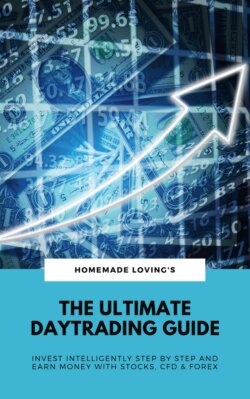Читать книгу The Ultimate Daytrading Guide: Invest Intelligently Step by Step And Earn Money With Stocks, CFD & Forex - HOMEMADE LOVING'S - Страница 5
На сайте Литреса книга снята с продажи.
Basic information about the stock exchange
ОглавлениеThe stock market trades in stocks, commodities such as gold and silver, bonds and interest rates. The prices on the stock exchange vary very strongly, so that there are no fixed prices in advance. But who can buy on the stock exchange? Anyone can participate on the stock exchange as a buyer or seller. Anyone can therefore participate in exchange trading, usually by electronic means. Whereas shares used to be delivered in physical form, nowadays they are only traded virtually. To ensure that everything is fair and transparent, there are fixed rules and companies that monitor transactions on the stock exchange. Basically, the stock exchange is nothing more than a market in which offers to buy and sell are brought together and settled via third parties.
For the ignorant, stocks are a kind of lottery. If you are lucky, you will immediately win the main prize. If there's a bit of bad luck in the game, you can lose everything very quickly. But for the knowledgeable, the stock market is definitely not a game of chance. There is more to stock trading than the ignorant think. If someone buys a share, he theoretically becomes an entrepreneur. A share is a share in a company. Whoever buys a share in a company becomes a co-owner of the company, so he owns a small piece of the big cake. So he owns a bit of the factory site, a fraction of the machines and even some of the goods produced. A share certifies the value of this company share, which is why it is also called a security.
But how can one share earn money? If the company - from which you bought shares - is doing well, the shareholder gets a share of the earnings. The shareholder thus participates in the success of the company. Accordingly, the co-owner receives a portion of the profit generated once a year - a dividend. If the company is doing better and better from an economic point of view, the shares of the companies also become more sought-after, so that the price of the shares of the company rises.
Of course you also have to consider the bad times. Of course, if the company's business is going worse, the shareholder will also notice. If the winnings fall, the payout may also be reduced. If the company even makes a loss, the shares in the company tend to be an unpopular investment. Conversely, the share price falls.
As you can see, the stock market has little in common with a lottery. So the shareholder is on the same roller coaster as the company and experiences the economic ups and downs at every moment. Of course, the shareholder also has some rights. For example, he may attend the Annual General Meeting once a year and decide together with the shareholder what the next step is. They can also criticise the management of the company and help decide how much should be paid out as a dividend.
How much money does the shareholder have to spend? In principle, a single share is enough to become a shareholder. He can therefore have a say even with a very small sum of money. Sounds pretty simple, doesn't it? For many people, the stock market may be quite a mess, but it is not. Imagine a market. You will see fresh fruit and vegetables offered for sale. Normally a price tag is attached to each product, but it is possible to trade on such a market. When people are slowly on their way home and the traders have to get rid of their products because they may not be able to eat them the next day, the traders may sell the fruit and vegetables at a cheaper price. That's the typical market, but that's how the stock market ticks. The price is determined on the basis of available supply and corresponding demand. However, the people who trade on the stock exchange buy less fruit and more stocks, commodities, bonds, food such as sugar and coffee or even electricity.
On the financial markets, the settlements are carried out by traders, who must comply with rules which are subject to strict supervision by the German authority and other special authorities. These authorities simply want to rule out the possibility that fraudsters may cause major damage. The stock market is seldom about food, and it is mostly about shares in valuable companies with jobs and social responsibility.
Nowadays shares are not really present or tangible. This means: Securities only change their owner virtually. Many things are settled digitally and electronically, so that a security changes from one securities account to another. The purchase price is therefore debited from one account and credited to the other account. On the stock exchange, many things happen only electronically. In the past, shareholders had the items delivered to them; today, the shares of all shareholders within a company are collected and recorded in a single collective certificate. This document is then stored at a neutral location, the securities collection point.
All transactions now run only on the computer. Even the share prices are transmitted electronically. The direct contact between buyer and seller no longer takes place. In Germany, however, there are still a few stock exchanges where the brokers can be found directly on the spot, but this system will lose importance over time and ultimately be driven out of the stock exchange.
